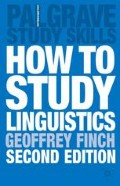Abstract
Introductions to linguistics will usually have a section on some of the ways in which we can assign a meaning to word strings, and for the majority of us it is this ability of words to ‘mean’ which constitutes their most important function. Much of our linguistic life is spent trying either to understand others or to ensure they understand us. But here we encounter a recurring difficulty because although language is designed to enable communication, it frequently seems to obstruct it. As we observed in Chapter 2, we can never seem to find the right words when we need them. Provokingly, it is just at those moments when we need language most — when we are in love or angry — that it seems to fail us. But this is not really the fault of language itself. The difficulty has more to do with our expectations than with the system. Most of the time, language performs the necessary functions we require of it without any effort, and we assume this will always be so. But we have only to think how complex and subtle is our inner world of thoughts and feelings, to realise that the demands we make of language can only partially be realised. In Chapter 2 I quoted a few lines from the poem Four Quartets, in which the poet T. S. Eliot comments on the frailty of words and the impossible burden we impose on them. Let me remind you of them again:
… Words strain, Crack and sometimes break, under the burden, Under the tension, slip, slide, perish, Decay with imprecision, will not stay in place, Will not stay still.
(‘Burnt Norton’, ll. 149–53)
Preview
Unable to display preview. Download preview PDF.
Further reading
Aitchison, J. (1994) Words in the Mind: An Introduction to the Mental Lexicon ( Oxford: Blackwell).
Blakemore, D. (1992) Understanding Utterances: An Introduction to Pragmatics ( Oxford: Blackwell).
Goatly, A. (1996) The Language of Metaphors ( London: Longman).
Green, G. (1988) Pragmatics and Natural Language Understanding ( New York: Erlbaum).
Grice, H. P. (1991) Studies in the Way of Words (Cambridge, Mass.: Harvard University Press).
Hofman, T. R. (1993) Realms of Meaning ( London: Longman).
Hudson, R. (1995) Word Meaning ( London: Routledge).
Hurford, J. R. and Heasley, B. (1983) Semantics: A Coursebook ( Cambridge: Cambridge University Press).
Jackson, H. (1988) Words and their Meanings ( London: Longman).
Lakoff, G. and Johnson, M. (1980) Metaphors We Live By ( Chicago: University of Chicago Press).
Lakoff, G. and Turner, M. (1989) Beyond Cool Reason ( Chicago: University of Chicago Press).
Leech, G. (1981) Semantics, 2nd edn (London: Pelican).
Leech, G. (1993) Principles of Pragmatics ( London: Longman).
Levinson, S. (1983) Pragmatics ( Cambridge: Cambridge University Press).
Lyons, J. (1981) Semantics (Cambridge: Cambridge University Press).
Palmer, F. R. (1981) Semantics, 2nd edn ( Cambridge: Cambridge University Press).
Ricoeur, P. (1986) The Rule of Metaphor ( London: Routledge).
Saussure, F. de (1966) Course in General Linguistics (originally published 1913), ed. C. Bally and A. Sechehay, trans. W. Baskin ( New York: McGraw-Hill).
Thomas, J. (1995) Meaning in Interaction: An Introduction to Pragmatics ( London: Longman).
Thomas, O. (1969) Metaphor and Related Subjects ( New York: Random House).
Tsohadtzidis, S. L. (1994) Foundations of Speech Act Theory ( London: Routledge).
Waldron, R. A. (1979) Sense and Sense Development, rev. edn ( London: André Deutsch).
Copyright information
© 2003 Geoffrey Finch
About this chapter
Cite this chapter
Finch, G. (2003). Studying Meaning. In: How to Study Linguistics. Palgrave Study Guides:Literature. Palgrave, London. https://doi.org/10.1007/978-0-230-80213-1_5
Download citation
DOI: https://doi.org/10.1007/978-0-230-80213-1_5
Publisher Name: Palgrave, London
Print ISBN: 978-1-4039-0106-4
Online ISBN: 978-0-230-80213-1
eBook Packages: Palgrave Social & Cultural Studies CollectionSocial Sciences (R0)

